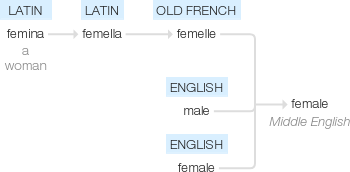Female
Middle English: from Old French femelle, from Latin femella, diminutive of femina ‘a woman’. The change in the ending was due to association with male, but the words male and female are not linked etymologically.
wiktionary
From Middle English female, an alteration of Middle English femelle, from Old French femele, femelle(“female”), from Medieval Latin fēmella(“a female”), from Latin fēmella(“a girl, a young female, a young woman”), diminutive of fēmina(“a woman”). The English spelling and pronunciation were remodelled under the influence of male, which is otherwise not etymologically related. Contrast woman, which is etymologically built on man (as in person).
etymonline
female (n.)
early 14c., from Old French femelle "woman, female" (12c.), from Medieval Latin femella "a female," from Latin femella "young female, girl," diminutive of femina "woman, a female" ("woman, female," literally "she who suckles," from PIE root *dhe(i)- "to suck").
WHEN the Himalayan peasant meets the he-bear in his pride,
He shouts to scare the monster, who will often turn aside.
But the she-bear thus accosted rends the peasant tooth and nail.
For the female of the species is more deadly than the male.
[Kipling]
Sense extended in Vulgar Latin from young humans to female of other animals, then to females generally. Compare Latin masculus, also a diminutive (see masculine). Spelling altered late 14c. in erroneous imitation of male. In modern use usually as an adjective (early 14c.). Reference to implements with sockets and corresponding parts is from 1660s.
